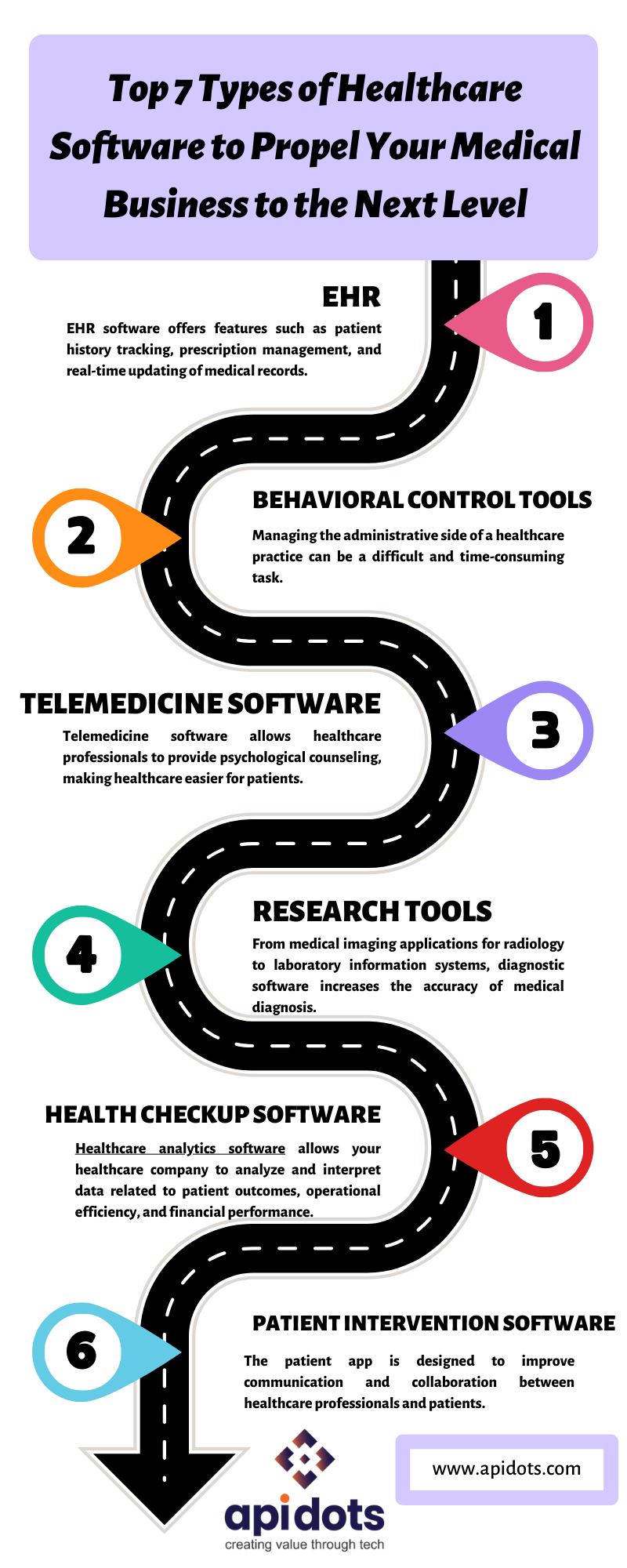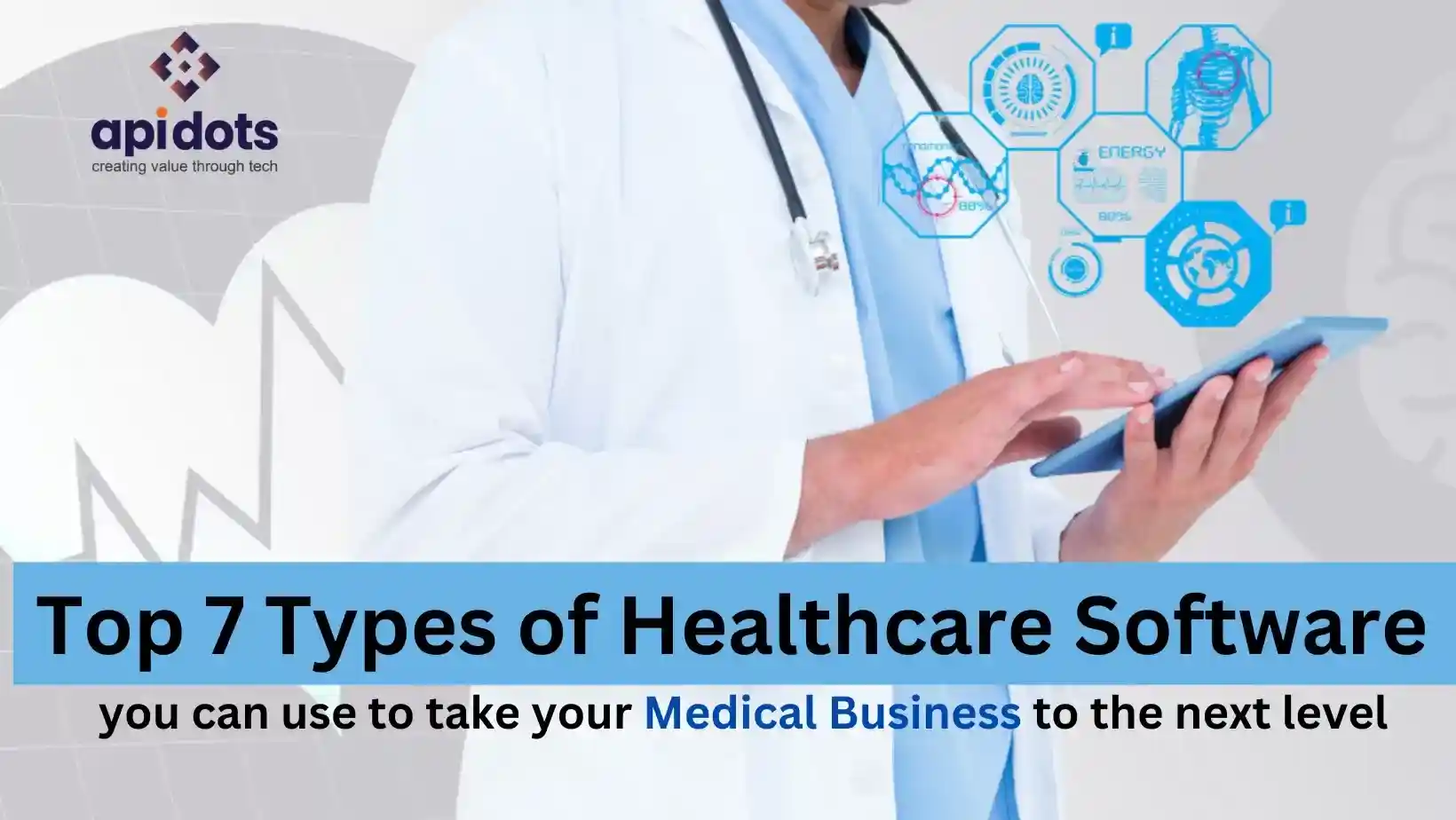In the fast-paced world of healthcare, staying ahead of the curve is critical to the success of any healthcare business. One of the most effective ways to achieve this is to use killer healthcare software.
From improving patient care to simplifying administrative tasks, the right software can transform your healthcare practice.
In this blog, we’ll explore the top seven types of healthcare apps that can take your healthcare business to new heights.

1. Electronic Health Record (EHR) Software
Electronic Health Records (EHR) software has become a cornerstone of modern healthcare.
Gone are the days of manuals and manuals. The EHR software automates patient information, making it easier to access authorized healthcare providers.
This not only improves the efficiency of medical professionals but also ensures seamless collaboration between different departments of your healthcare business.
EHR software offers features such as patient history tracking, prescription management, and real-time updating of medical records.
This not only improves patient care but also reduces the chance of potential errors in the documentation process.
2. Behavioral Control Tools
Managing the administrative side of a healthcare practice can be a difficult and time-consuming task.
Practice management software is designed to streamline these tasks, allowing your healthcare business to run more efficiently.
This type of software includes scheduling, invoicing, and reporting functions.
With the practice management tool, you can reschedule appointments, track patient visits, and manage billing and insurance.
This not only saves your team time but also reduces the chance of errors in billing and scheduling, ultimately improving the patient experience.
3. Telemedicine Software
The growth of telemedicine is one of the most important factors in recent years, especially considering the global shift to remote work and digital solutions.
Telemedicine software allows healthcare professionals to provide psychological counseling, making healthcare easier for patients.
By implementing telemedicine software, your healthcare company can reach a larger patient base, improve patient engagement, and reduce the need for physical office visits.
This is especially important in situations where self-selection may not be possible, such as during a global health crisis.
4. Research Tools
Diagnostic tools play an important role in the accurate and timely analysis of medical conditions.
From medical imaging applications for radiology to laboratory information systems, diagnostic software increases the accuracy of medical diagnosis.
Investing in advanced diagnostic software can improve the speed and accuracy of test results, resulting in better outcomes for patients.
It also enables seamless communication between different departments within your healthcare organization, ensuring critical diagnostic information is easily accessible to relevant healthcare professionals.
5. Health Checkup Software
In the era of big data, the use of analytics is essential to making the right healthcare decisions.
Healthcare analytics software allows your healthcare company to analyze and interpret data related to patient outcomes, operational efficiency, and financial performance.
By harnessing the power of data analytics, you can identify trends, optimize resource allocation, and improve overall performance.
This software empowers healthcare professionals to make data-driven decisions that can positively impact patient care and the success of their healthcare businesses.
6. Patient Intervention Software
Patient engagement is critical to delivering high-quality healthcare. The patient app is designed to improve communication and collaboration between healthcare professionals and patients.
This can include features like reminders, saved messages, and educational resources.
By improving patient engagement, your healthcare business can improve patient satisfaction, encourage adherence to treatment plans, and, ultimately, contribute to better health outcomes.
Patient engagement software also enables personalized communications, helping to build stronger relationships between healthcare providers and their patients.
7. Cash Flow Management (RCM) Software
Managing the financial side of a healthcare practice is critical to its sustainability.
Revenue management software (RCM) is designed to improve healthcare facilities’ financial processes, from scheduling appointments to making claims.
READ MORE | 7 Ways Healthcare Chatbots are Disrupting the Industry
Conclusion
In conclusion, the right healthcare software can change the way your healthcare business operates.
From improving patient care and simplifying administrative tasks to optimizing financial processes, any type of software plays a critical role in the overall success of your medical practice.
By keeping up with technological advances and adopting new healthcare solutions, you can take your healthcare business to the next level, providing better care and experiences for both patients and healthcare professionals.

















